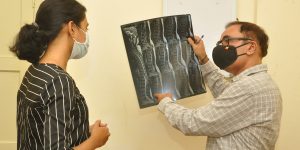
Physiotherapy Benefits: Physiotherapy, today is a form of preventive medicine and not just a post operative solution.
Physiotherapy treatments help people to restore, and maximize their overall well-being. A physiotherapist typically has in-depth knowledge of the functions of your body as well as skills to diagnose and treat injury and disability.
Some examples of treatments offered by a Physio include Neck & Back pain, Issues in the bones, Joints, Ligaments, Lungs, Disability due to Heart trouble, and Loss of Mobility due to an accident or trauma, Pelvic issues and much more.

The treatment goal of an orthopaedic physiotherapist is pain relief. They focus on improving strength, joint range of motion, flexibility and restoration of full function of the joint which is causing pain. It also involves pre and postoperative rehabilitation of Knee, Hip and Shoulder.
An orthopaedic physiotherapist will evaluate your condition, determine movement diagnosis, create a plan for treatment, administer appropriate care, and educate you about injury management and prevention of further injury.
Conditions treated by an Orthopaedic Physio include Fracture rehabilitation, Osteo-Arthritis, Rheumatoid-Arthritis, Osteoporosis, Ligament strain, Sprain, Scoliosis, Spondylolysis, and post surgical rehabilitation of foot, ankle, hip, knee and shoulder.
Typical treatments include Manual therapy, Exercise Programmes, Ultrasound therapy, Neuromuscular Stimulation, Dry-Needling, acupuncture and Interferential Therapy (IFT).
An orthopaedic surgeon deals with diagnosis, pre-operative treatment, operative treatment and post-operative treatment of injuries or diseases of the musculoskeletal system.
Physiotherapy on the other hand is a style of treatment that improves the range of motion, builds up muscle strength and improves endurance. A physiotherapist can guide you with an exercise programme and provide various treatments for pain reduction and better movement range.
In cases where bone or joint damage is extensive, an orthopaedic surgeon will play an important role due to the requirement of treatment forms such as a surgery.
Physiotherapy aims to assist in freeing a patient from pain and prevent recurrence. This line of treatment helps a patient to build endurance and muscle strength. It also helps a patient to improve coordination, restore motion and reduce pain or inflammation.
Orthopaedic surgery, comes into play when physiotherapy is no longer effective. This usually occurs when injuries to the muscles and tissues are more severe. It could be the case of a serious fracture, where surgery is required for proper healing.
Post Surgery physiotherapy can then help strengthen the tendons and tissues that surround the injured area. The extent of the injury is the deciding factor in choosing the type of treatment required. For example, physiotherapy is effective in strains or sprains. Orthopaedic surgery, on the other hand, will be required for an injury like ACL or meniscus tear.
Physiotherapy can be divided into sub-categories, focusing on various aspects of treatment and rehabilitation.
"*" indicates required fields

Neurological rehabilitation is a program that is designed to help patients suffering from diseases, disorders or injuries of the nervous system. Neurological rehab can help with improved function, reduced symptoms and better well-being.
Neurological rehabilitation can help with infections, injuries, tumors, degenerative diseases, structural defects or disorders in the circulatory system. Conditions that may be managed include vascular disorders such as strokes, infections such as meningitis, polio, trauma such as brain or spinal cord injury, neuromuscular disorders such as carpal tunnel syndrome, muscular dystrophy, or Guillain Barre Syndrome, functional disorders such as dizziness and seizure, or degenerative disorders such as multiple sclerosis, Huntington chorea and Parkinson’s disease.
A neurological rehab team will generally consist of a neurologist, orthopaedic surgeon, physiotherapist and other specialty doctors. The rehab program may include assistance with daily activities, speech therapy, stress and depression management, bladder and bowel training, mobility improvement, exercise, social skills retraining, nutritional counseling, pain management, promotion of independence and vocational counseling.
Neurological rehabilitation programs are designed according to a patient’s individual needs and the timeline for each program will depend on the condition being treated. For example, a patient suffering from a traumatic brain injury may take around two years to recover. The time could vary from person to person. Similarly, neurological rehabilitation for a person suffering from a stroke can vary from weeks to years depending on the severity of the stroke.
A neurological physiotherapist is trained to treat various neurological conditions to help a patient to regain or improve movement and attain functional independence. Physiotherapists use various forms of treatment such as stretching, balance re-education, electrical stimulation, postural exercise, strengthening, joint mobilization, spasticity management and education on lifestyle and fatigue management.
Neurological disorders can affect millions of people every year and need to be identified and treated to avoid future complications. These disorders can affect people of any age or health. The disorders can also affect different people with different symptoms and varying severity. Some of the most common neurological disorders are stroke, epilepsy, Parkinson’s disease, multiple sclerosis and Alzheimer’s disease.
The time taken to recover from a brain injury depends on the severity, with the prognosis for mild brain injury being better than moderate, and moderate better than severe. With mild injury, most people recover within 3 months. In the case of a moderate brain injury, most patients recover a majority of their brain function with the additional help of occupational and speech therapy. Recovery from a severe brain injury is a little harder to predict as it depends on the severity of damage, the location of the trauma, and other aspects.
[wpforms id=”10695″]

Postoperative physiotherapy is a program designed to re-establish muscle strength, restore mobility, reduce pain and improve overall functions in the body after surgery.
Post-operative physiotherapy may be essential after a variety of surgeries such as orthopaedic, cardiac and neurological. Different types of surgeries can lead to different consequences. These include pain, reduced strength and movement, balance and coordination difficulties, and postural issues after orthopaedic surgeries. Consequences such as breathing difficulty, postural problems and pain after cardiac surgeries, or, muscle shortening, reduced mobility and breathing issues after neurological surgeries are common. Postoperative physiotherapy is essential as it aids in pain management, strengthening of muscles, improvement of posture, balance, coordination and much more.
Physiotherapy should begin right after surgery, at the hospital. It needs to be continued even after discharge as it helps in faster recovery. Physiotherapy will reduce pain, improve mobility, muscle strength and also assist with respiratory and circulatory problems. Physiotherapy in the early recovery phase will help in pain management, reduction of swelling, restoration of motion. The second phase involves tougher strength exercises, improvement of balance, restoration of full joint motion and soft tissue treatment. This is followed by more complex exercises to improve balance and attain full range of motion if not already achieved.
Pre-Operative physiotherapy is being increasingly recommended by surgeons due to its benefits. Studies indicate that starting physiotherapy around a month before surgery can speed up recovery time and reduce surgery-related anxiety. Preoperative physiotherapy helps in reducing pain with the help of exercise, massage, and heat or ice therapies. It can help to improve the overall outcome of surgery as it helps in improving strength. Due to the increase in strength and endurance as a result of physiotherapy, it may reduce chances of complications. Surgery mostly leads to reduced strength and endurance. Preoperative physiotherapy can reduce the amount of strength lost during surgery, making recovery easier. It also shortens the recovery period due to the fact that it improves muscle strength.